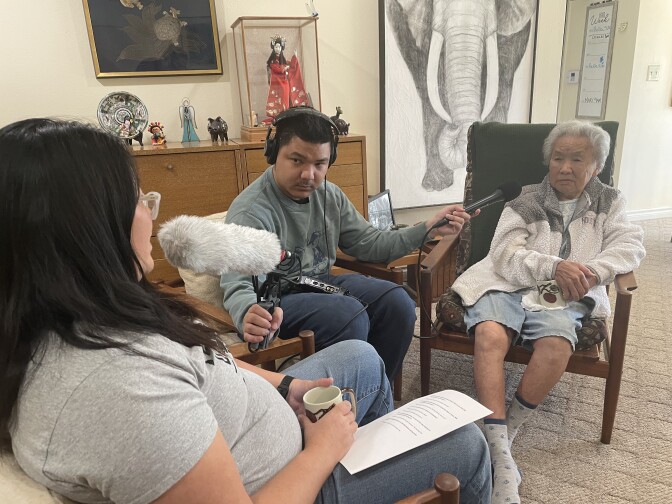This story is free to read because readers choose to support LAist. If you find value in independent local reporting, make a donation to power our newsroom today.
How did Japanese American incarceration shape the generations that followed?

Topline:
Leah Bash’s father was a baby when he and his entire family were forced into a system of federal incarceration camps during World War II, along with more than 125,000 other Japanese Americans. On Episode 5 of Inheriting, Bash is on a mission — a generation later — to figure out how incarceration affected her mental health.
Meet Leah Inaba Bash: Bash is a loving dog mom, an avid runner, and a free spirit who marches to the beat of her own drum. Case in point: She wore a beaded, poofy black dress on her wedding day. She’s built a life for herself with her husband Scott in San Diego. But there’s a part of Bash’s family background she’s always had questions about, and that’s the subject of how the incarceration of Japanese Americans affected her immediate and extended family members. Relatives on both sides of Leah’s family were incarcerated during World War II.

What is "Inheriting"?
Inheriting is a show about Asian American and Pacific Islander families, which explores how one event in history can ripple through generations. In doing so, the show seeks to break apart the AAPI monolith and tell a fuller story of these communities. Learn more at LAist.com/Inheriting
“It’s an untouchable subject. I can't just call up a cousin and be like, ‘Hey, does your mom suffer mentally from camp?’ It's not the happy subject that people wanna talk about,’” she says.
When Bash learns about her dad’s struggles with panic attacks and is herself diagnosed with bipolar disorder, she starts to ask more questions about her family’s time at camp, and how that event shaped the family’s health and well-being generations later.

World War II’s Japanese American incarceration camps: In February 1942, a couple of months after the attack on Pearl Harbor, President Franklin D. Roosevelt issued Executive Order 9066, which resulted in the incarceration of more than 125,000 Japanese Americans. The order allowed U.S. military leaders to forcibly remove people deemed a threat to national security from their homes on the West Coast to remote, isolated camps. Among those incarcerated was Bash’s father, Shizuo Anthony (Tony) Inaba, who was only 2 months old at the time.
Federal agents forced the Inaba family to leave their farm in Riverside. While Tony’s father was sent to a prison camp, the rest of the family traveled more than 200 miles northeast to the Manzanar War Relocation Center. The family was not reunited until 1943 at the Crystal City Detention Center in Texas.
Bash’s aunt, Haru Kuromiya, was a teenager when the family was incarcerated. On Inheriting, Haru tells Bash what it was like. “Everything was such a turmoil all at once and we had no control over anything and it just changed our lives,” Kuromiya says.

Conditions were difficult. Behind barbed wire fences, families were crowded into barracks with communal bathrooms, laundry facilities and dining halls. They had to endure extreme weather, including strong dust storms. Kuromiya remembers dust being everywhere — on her hair, skin, and nails. Fresh meat, produce, and milk were scarce.
Hearing her aunt talk about this experience, Bash gains insights into what her dad’s early childhood was like and how that may have followed him into adulthood. “He was just born into this shell of a life versus what you should be having around you as a baby,” Bash says.

After being incarcerated for three-and-a-half years, the Inaba family returned to their farm in Riverside in 1946, but not before their experiences left their mark. Bash is determined to make sense of her family’s history and its effects on their mental health, including her own.
How can I listen to more of this story?
Hear episode 5 of Inheriting:
New episodes of Inheriting publish every Thursday wherever you get your podcasts and on LAist.com/Inheriting.









